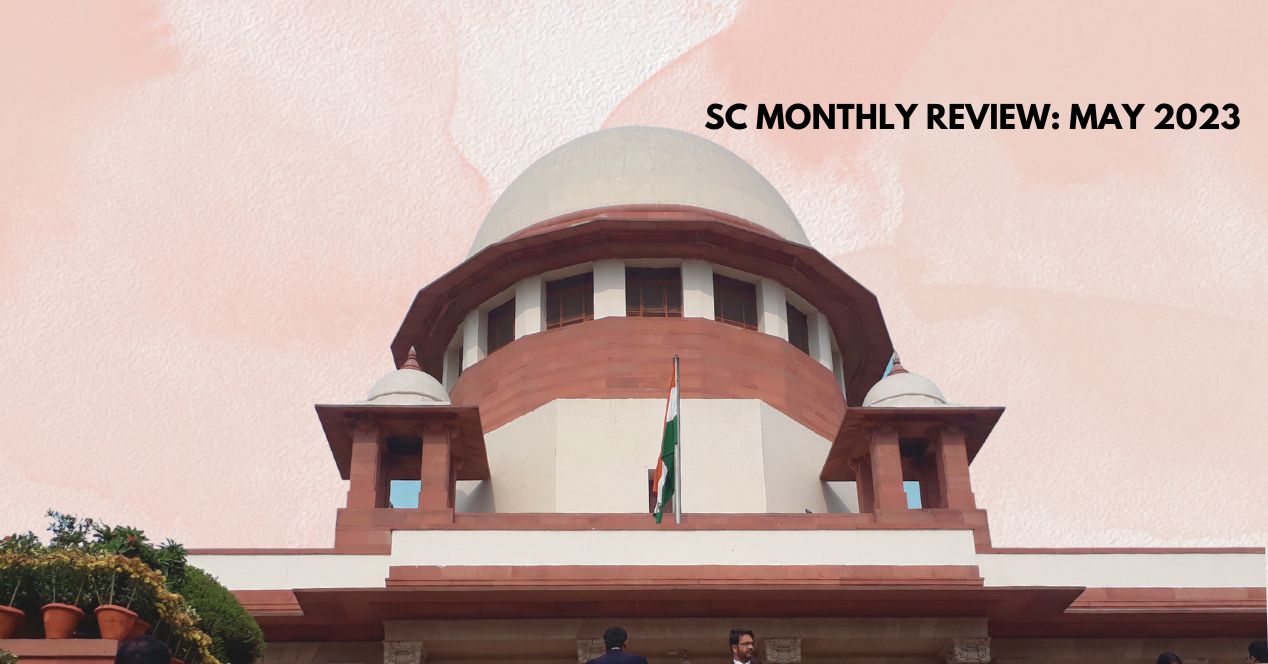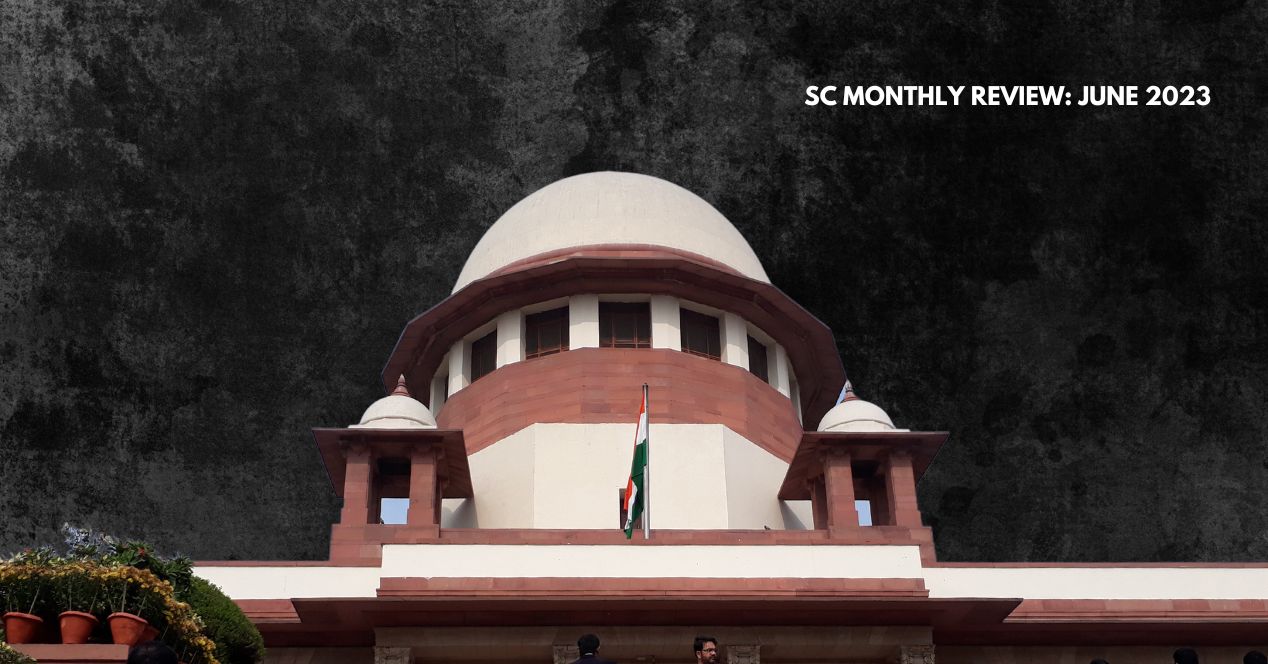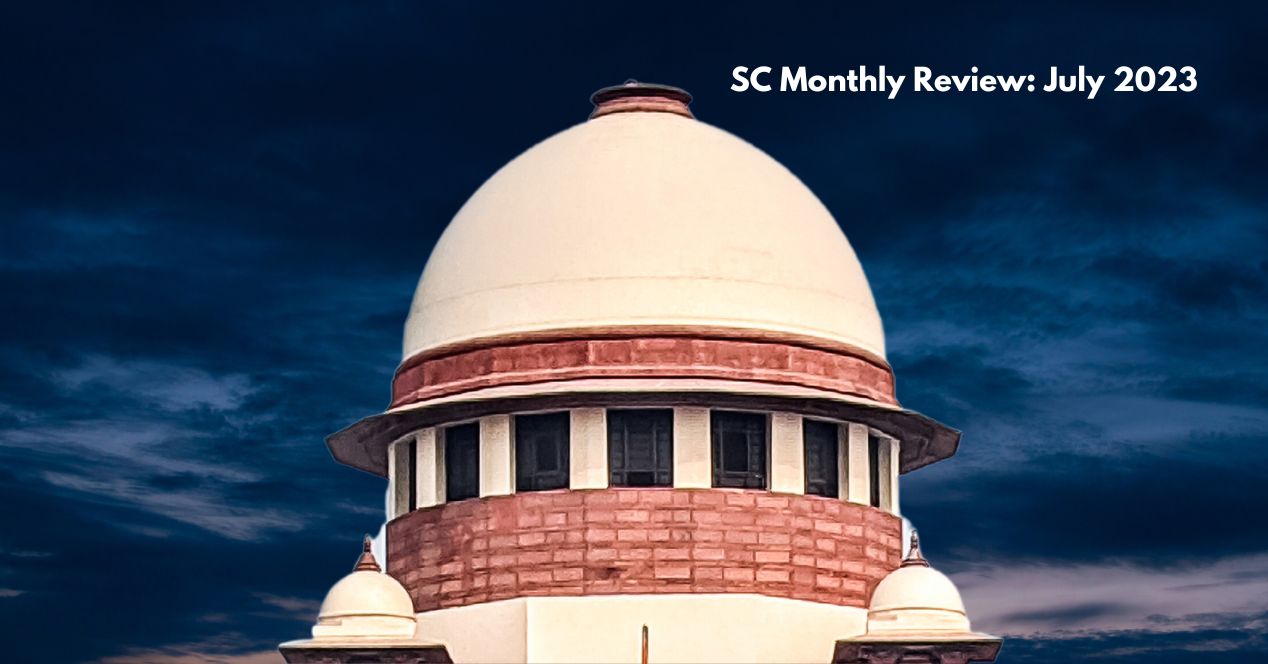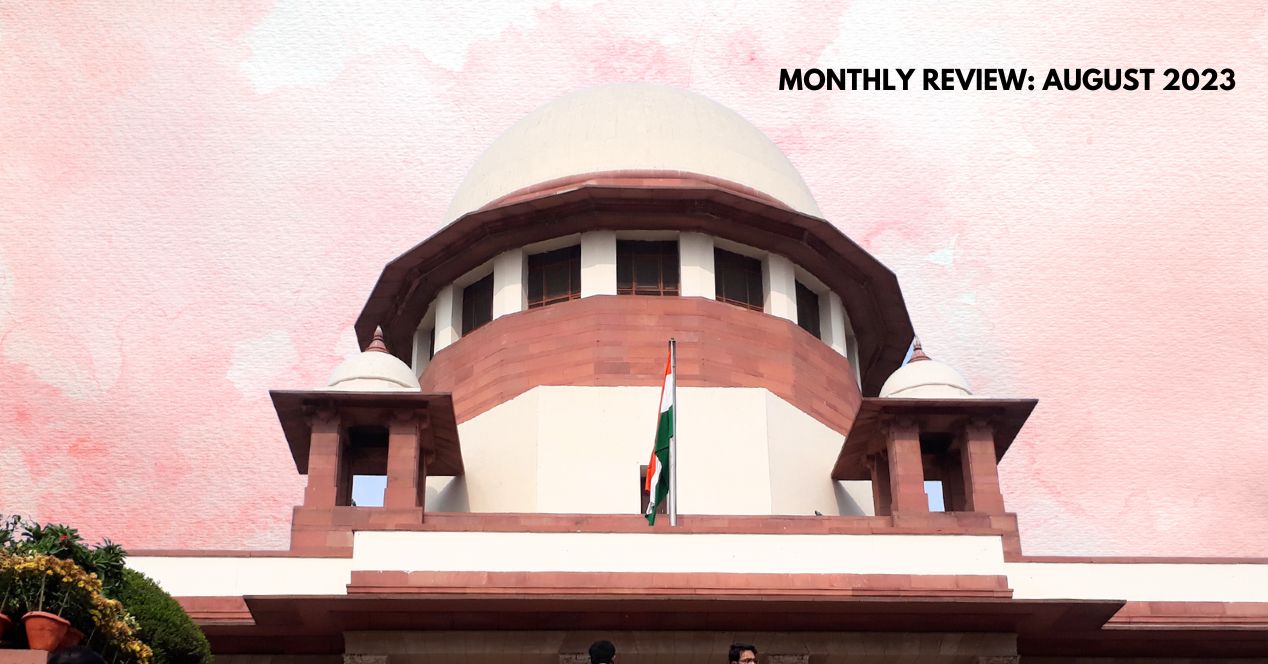Analysis
Monthly Review: September 2023
In a month marked by Constitution Bench activity, the Court also heard critical matters on convict remission policy and the Manipur violence
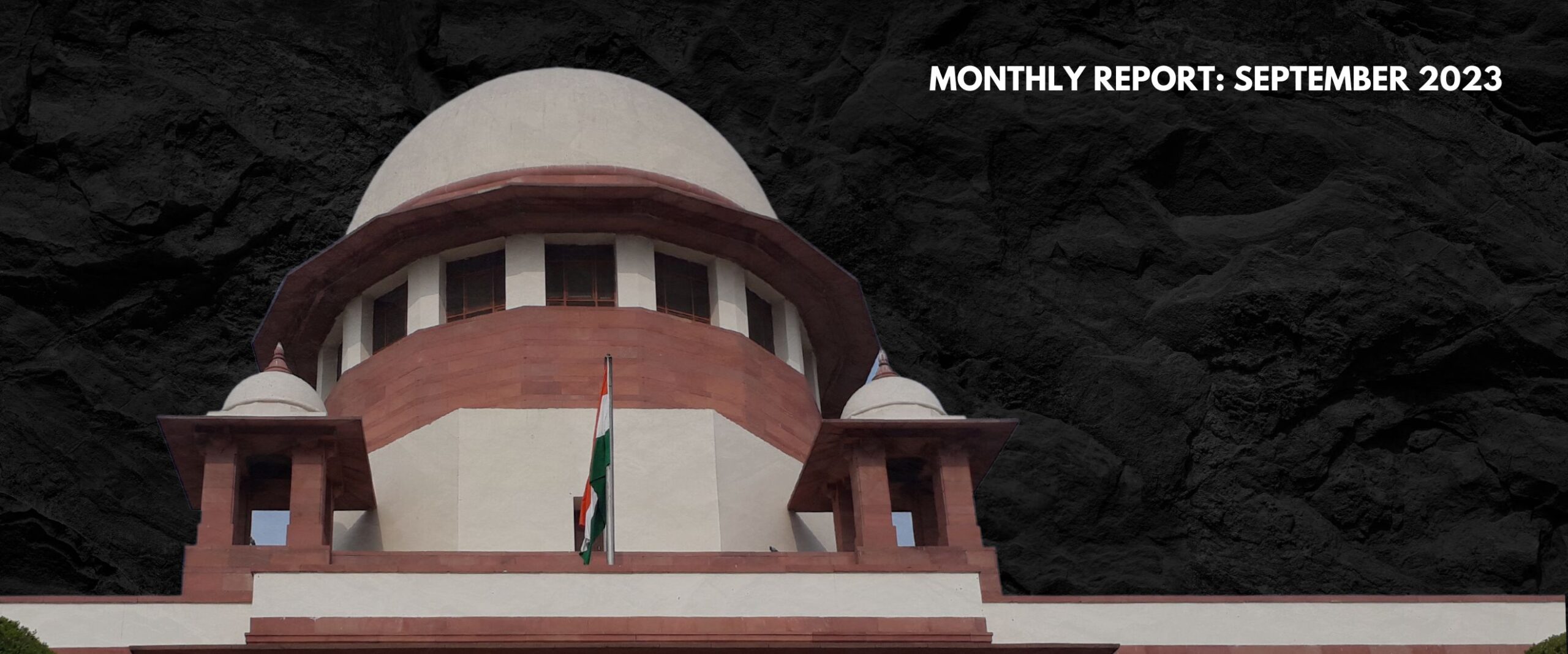
September was a busy month for the apex court, with a flurry of Constitution Bench and Division Bench activity on matters of critical importance. Eight Constitution benches assembled 13 times to hear cases on a wide range of issues. These included matters like the challenge to the abrogation of Article 370, judicial vacancies in the lower courts of Haryana and the Bilkis Bano convict remission case.
The challenge to the abrogation of Article 370: Judgement reserved
On 5 September, the five-judge bench of the Supreme Court concluded hearings in the challenge to the abrogation of Article 370 and reserved judgement in the case. The hearings, spanning 16 days, saw 60 hours of arguments from 40 lawyers on both sides. The lawyers passionately deliberated the constitutional status of J&K, delving deep into the region’s history and politics, contemplating the powers of the President, the rules of interpreting the Constitution, and an array of cases from the past.
You can catch up on the petitioners and respondents submissions on six key issues here.
The petitioners’ side argued for approximately 40 hours out of which Senior Advocate Kapil Sibal argued for a total of 845.65 minutes, which was not only 35 percent of the petitioners’ time but also the most amount of time taken by an individual lawyer in this matter. Twenty-three lawyers represented the respondents. Solicitor General Tushar Mehta led the respondents’ arguments and argued for a total of 657 minutes, taking up 54 percent of the respondents’ time.
For more on time spent on arguments, read the Arguments Time Split.
The court proceedings of Day 15 saw some back-and-forth on the Court’s demand for an affidavit from one of the petitioners. The affidavit was meant to prove his allegiance to the Constitution. Read our Desk Brief on the subject.
Challenging the release of convicts in the Bilkis Bano case
Justice B.V. Nagarathna and Justice Ujjal Bhuyan continued to hear the challenge to the early release of the convicts in the Bilkis Bano case. On Day 11 of the hearings, Senior Advocate Sidharth Luthra argued that remission must focus on an individual’s behaviour in jail and not on the heinousness of the crime committed. Advocate Shoba Gupta, representing Bilkis Bano in the case, suggested that the nature of the crime should be central to any decision to grant remission.
Five days later, on 20 September, the defendants also argued that Bilkis Bano could not challenge the remission, prompting Justice Nagarathna to ask “If not the victim, then who can challenge it?”
For Assistant Editor Advay Vora, who has been tracking the case, these courtroom exchanges brought alive a classroom discussion on deterrence and the reformative theory of justice. . The case is set to continue with rejoinder arguments being heard on 9 October 2023.
Three Constitution Benches in One Day
Assam’s National Register of Citizens
On 20 September 2023, a Constitution Bench headed by the Chief Justice of India issued procedural directions in a set of petitions challenging Section 6A of the Citizenship Act. The provision, based on the Assam Accord of 1985, lays down special citizenship rules for the state. After considering the requests and suggestions presented by Solicitor General Tushar Mehta and Senior Advocates Shyam Divan, Indira Jaising and C.U. Singh, the Bench scheduled the hearing for 17 October 2023.
Immunity for lawmakers in cases of bribery
A Constitution Bench led by CJI D.Y. Chandrachud referred the 25-year-old Supreme Court judgement in P.V. Narasimha Rao v State (1998) to a seven-judge Bench to determine the extent of immunity for lawmakers in cases of bribery. The majority in Narasimha Rao held that legislators enjoy immunity against criminal prosecution on a bribery charge, if it is in connection with a speech or a vote in Parliament. After listening to arguments by Senior Advocates Raju Ramachandran, Gopal Sankaranarayan and P.S. Patwalia, and Attorney General R. Venkataramani, the CJI agreed that the judgement needed reconsideration.
Challenge to Extended Reservations
A five-judge Constitution Bench convened to hear petitions that challenged the 79th Constitutional Amendment, which extended SC/ST reservations in the Lok Sabha and State Legislative Assemblies. Senior Advocates C. Aryama Sundaram, Gopal Sankaranarayan, S.M. Chandrasekhar, Attorney General R. Venkataramni, and Solicitor General Tushar Mehta presented their submissions. The court requested both parties to prepare a joint compilation and scheduled a hearing for 21 November 2023.
Manipur Mayhem
On 2 September, the Editors Guild of India published a fact-finding report, proclaiming that news coverage of the ethnic violence in Manipur was partisan and almost entirely based on the narrative of the majority Meitei community. Soon after, multiple FIRs were filed against EGI’s executive members on the grounds of incorrect reporting and circulating false information. EGI moved the Supreme Court, contending that they conducted their investigation on the request of the Indian Army and therefore could not be prosecuted for it. While transferring the case to the Delhi High Court, the three-judge Bench of CJI D.Y. Chandrachud, Justice J.B. Pardiwala and Justice Manoj Mishra criticised the charges against the Guild and said that the chargesheet was making false declarations.
Shiv Sena Conflict Resurfaces
Four months after the Supreme Court’s judgement in the Shiv Sena disqualification case, the Eknath Shinde and Uddhav Thackeray factions are back in Court. Senior Advocate Kapil Sibal, representing the Thackeray faction informed the Bench that no disqualification proceedings had been initiated against MLAs of the Shinde faction. Arguing that the disqualification proceedings had become a “farce”, Sibal requested the Court to issue a writ of mandamus.
On 18 September, the Supreme Court directed the Speaker of the Maharashtra Legislative Assembly to initiate disqualification proceedings against MLAs from the Shinde factions. Chief Justice D.Y. Chandrachud emphasised that the Speaker must abide by the ruling of the Supreme Court and directed that disqualification proceedings be initiated by him within a week.
Constitutionality of Sedition
On 12 September 2023, the Supreme Court referred the batch of petitions challenging the sedition law under Section 124A of the Indian Penal Code to a bench of “at least five judges.” The petitioners argue that the sedition law is a colonial relic that suppresses free speech. The Union of India has sought to postpone the hearing to a later time on the ground that it was in the process of introducing a new bill replacing the Indian Penal Code.
The Court, however, held that there was no reason to wait for Parliament to enact a new penal law and referred the case to a Constitution Bench. The larger Bench will revisit the decision in Kedarnath Singh v State of Bihar (1962), where the Supreme Court upheld the constitutionality of sedition.
The chaos of the licence regime
On 13 September, a Constitution Bench led by CJI D.Y. Chandrachud resumed hearings in the case concerning “light-motor vehicle licences” under the Motor Vehicles Act. The main issue there was whether a person holding a light motor vehicle licence is automatically permitted to drive a ‘Transport Vehicle of Light Motor Vehicle Class’ weighing less than 7500 kg.
The Court recognized that the matter at hand involved not only the interpretation of the law but also the “social impact” on gig workers who have been driving transport vehicles based on their LMV licence. Day 4 of hearings concluded with the Bench expressing their interest in hearing the Union’s submissions on the effects of the post-Mukund Dewangan regime and changes in the transport sector.
Judicial Vacancies in the Lower Courts
On September 26, the Supreme Court dismissed an application filed by the Haryana Government concerning judicial examinations in the state. The government requested that judicial examinations in the state be conducted by the Public Services Commission as per the Punjab Civil Service Rules (Judicial Branch), 1951. Senior Advocate Vijay Hansaria appeared for the state while Senior Advocate P.S. Patwalia argued for the High Court. Every time a notification to fill up vacancies was issued, Hansaria argued, the rules were altered so that a High Court Committee was in charge of the examination paper, invigilation and selection. This was causing unnecessary delays.
Patwalia countered by suggesting that the High Court oversaw the process of judicial appointments in most states. Even in the few states where the Public Services Commission was overseeing the exam, the process was closely monitored by the High Court.
The Bench dismissed the application, on the grounds that there was no objective data to administer a change in the process. The Court also directed the state to take steps to fill the pending vacancies within 2 weeks.
Retrospective Immunity Against Arrest
On 11 September, a Constitution Bench delivered the judgement in Dr R.R. Kishore v C.B.I (2006). Justice Vikram Nath read out the unanimous judgement on behalf of the Bench, which held that Section 6A of the Delhi Special Police Establishment Act, which provides for prior approval of the Union government before initiating an inquiry against officials, has nothing to do with Article 20 of the Constitution, which deals with conviction.
The Bench held Dr. Subramnian Swamy v Director, C.B.I (2014), which struck down Section 6A, will have retrospective effect. This means that public officials do not have protection from arrest for offences committed before Subramanian Swamy.

